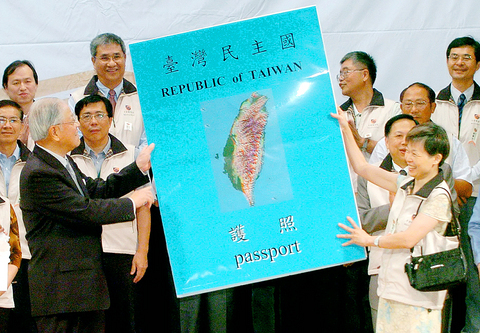Former president Lee Teng-hui (
While China claims to want to help Taiwan export agricultural produce to China and promote Chinese tourism, it is in fact a strategy born of China's fear of the US' military might, he said during a speech at a joint graduation ceremony at the Lee Teng-hui School yesterday.
Sow chaos

PHOTO: WANG MIN-WEI, TAIPEI TIMES
China's goal is to bring chaos to Taiwan and cause the US to waver in its support of Taiwan, he said.
Lee added that a new cold war between the US, China and Russia is only just beginning. He described this as a blessing for the nation that it should take advantage of, although Taiwan must also gain an understanding of US strategy, as well as of China's strategy to annex Taiwan.
Fruit
Lee further criticized the government for not using its powers to intervene in talks on exporting agricultural produce to China. Trade in agricultural products is regulated by the World Trade Organization, he said, and the government should negotiate with China through the Board of Foreign Trade (BOFT, 國貿局) or the Taiwan External Trade Development Council (TAITRA, 外貿協會) on which agricultural products to export, as well as volumes and production. This would make it easier for farmers to set production goals while at the same time protecting their rights and interests, he said.
Lee also took aim at the media, saying it would be worthwhile for nation's news outlets to look into the US Congress' recent blocking of China National Offshore Oil Corp's (CNOOC) attempt to acquire the US oil company Unocal, rather than only concerning themselves with a certain entertainer's visit to Taiwan.
Media's focus
Lee was apparently referring to the South Korean actor Bae Yong-joon who arrived in Taipei on Friday for a three-day visit to promote his new movie. Bae, 32, rose to heartthrob status in East Asia after starring in the South Korean soap opera Winter Sonata and his visit is receiving widespread media coverage.
Lee also directed criticism toward the pan-blue camp, castigating former Chinese Nationalist Party (KMT) Chairman Lien Chan (

Taiwan yesterday denied Chinese allegations that its military was behind a cyberattack on a technology company in Guangzhou, after city authorities issued warrants for 20 suspects. The Guangzhou Municipal Public Security Bureau earlier yesterday issued warrants for 20 people it identified as members of the Information, Communications and Electronic Force Command (ICEFCOM). The bureau alleged they were behind a May 20 cyberattack targeting the backend system of a self-service facility at the company. “ICEFCOM, under Taiwan’s ruling Democratic Progressive Party, directed the illegal attack,” the warrant says. The bureau placed a bounty of 10,000 yuan (US$1,392) on each of the 20 people named in

The High Court yesterday found a New Taipei City woman guilty of charges related to helping Beijing secure surrender agreements from military service members. Lee Huei-hsin (李慧馨) was sentenced to six years and eight months in prison for breaching the National Security Act (國家安全法), making illegal compacts with government employees and bribery, the court said. The verdict is final. Lee, the manager of a temple in the city’s Lujhou District (蘆洲), was accused of arranging for eight service members to make surrender pledges to the Chinese People’s Liberation Army in exchange for money, the court said. The pledges, which required them to provide identification

Nine retired generals from Taiwan, Japan and the US have been invited to participate in a tabletop exercise hosted by the Taipei School of Economics and Political Science Foundation tomorrow and Wednesday that simulates a potential Chinese invasion of Taiwan in 2030, the foundation said yesterday. The five retired Taiwanese generals would include retired admiral Lee Hsi-min (李喜明), joined by retired US Navy admiral Michael Mullen and former chief of staff of the Japan Self-Defense Forces general Shigeru Iwasaki, it said. The simulation aims to offer strategic insights into regional security and peace in the Taiwan Strait, it added. Foundation chair Huang Huang-hsiung

’DISTORTION’: Beijing’s assertion that the US agreed with its position on Taiwan is a recurring tactic it uses to falsely reinforce its sovereignty claims, MOFA said The Ministry of Foreign Affairs (MOFA) yesterday said Chinese state media deliberately distorted Taiwan’s sovereign status, following reports that US President Donald Trump agreed to uphold the “one China” policy in a phone call with Chinese President Xi Jinping (習近平). During the more than one-hour-long call, Xi urged Trump to retreat from trade measures that roiled the global economy and cautioned him against threatening steps on Taiwan, a Chinese government summary of the call said. China’s official Xinhua news agency quoted Xi as saying that the US should handle the Taiwan issue cautiously and avoid the two countries being drawn into dangerous